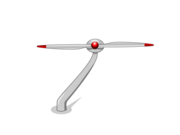面
face / side / surface / aspect / top / classifier for objects with flat surfaces such as drums, mirrors, flags etc
面
=
丆
+
囬
:
Mnemonic symbol: a spray flask with one of these liquids which make a surface super slippery.
In the anthill's bathroom (an4), Marilyn Monroe (mi) wants to set up a wind wheel (丆) on top of a closet (囬). Just as she tries to fix it she slips and falls down, the wind wheel crashing on the floor. She didn't notice that somebody used a can of non-stick coating (面) on the closet's surfaces (面).
In the anthill's bathroom (an4), Marilyn Monroe (mi) wants to set up a wind wheel (丆) on top of a closet (囬). Just as she tries to fix it she slips and falls down, the wind wheel crashing on the floor. She didn't notice that somebody used a can of non-stick coating (面) on the closet's surfaces (面).
面 character breakdown
Characters with 面 as component
flour / noodles / (of food) soft (not crunchy) / (slang) (of a person) ineffectual / spineless
Words with 面
to be entirely on one side / one-sided / lopsided / partisan / overwhelmingly on one side
lit. one body two sides (idiom) / fig. a situation with two sides to it
better kept under the table (idiom) / not to be disclosed / too inferior to show in public
lit. not for the monk's sake but for the Buddha's sake (idiom) / fig. (to do sth for sb) out of deference to sb else
lit. not to know the true face of Lushan Mountain (idiom) / fig. can't see the forest for the trees
